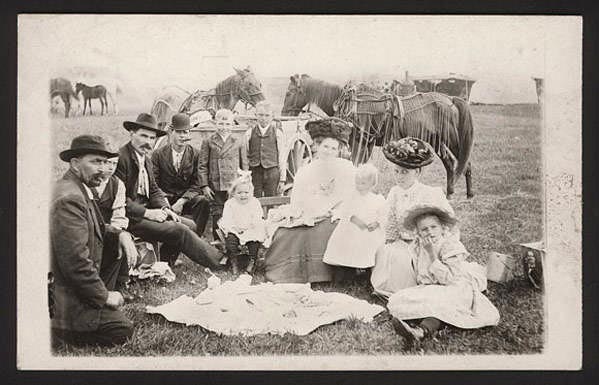Picnicking is one of the most enjoyable summer pastimes, and Nebraskans more than one hundred years ago enjoyed it as much as we do today. Occasionally, however, these outings were marred by mishaps more serious than the presence of ants. The Omaha Daily Bee of August 17, 1885, reported several unusual occurrences at the recent Union Pacific band picnic at North Bend. The Bee said:
“The train of fourteen well-filled coaches left the Union Pacific depot [in Omaha] at 8:30 a. m. . . . The members of the band had considerable trouble when the train started, as it was discovered that suspicious persons were on board and that between thirty and forty boys were trying to beat their way and were concealed under the seats. The train was therefore stopped and the gang removed from the train. At Valley a little fellow was discovered riding on the trucks under the car. He was pulled out with his hat all in shreds and clothes badly torn.”
When the UP picnickers reached North Bend, they enjoyed a basket lunch and an afternoon of games, one of which caused injury to a bystander. “Mrs. Lewis Stemm had a very narrow escape from what might have been a fatal accident. She was passing by the heavyweight striking machine, while the mallet was raised, and was struck on the side of the head. She was unconscious for a moment but was soon revived. A hammock was put up by the members of the band and the suffering woman was made as comfortable as could be done. The members of the band said after this they will never allow any more striking machines at their picnic.”
Another unusual accident befell a party of Albion picnickers in 1907. The Norfolk Weekly News-Journal of June 14, 1907, under the headline “Buggy Burns, Lunch Too,” reported: “The most peculiar conflagration ever heard of happened in this vicinity. A fishing party given by Dr. and Mrs. L. E. Scouten, in honor of Miss Vera Allen of Omaha, were enjoying the enticing pastime of landing the elusive trout and sunfish and were so engrossed in the pleasant pursuit that they were utterly unaware of the fact that the carriage in which they came to the brook was burning while standing with the horses hitched to it.
“After awhile the pangs of hunger drove the party to their base of supplies and when they arrived at where they hoped to partake of an elaborate out-of-door dinner they found the feast in ashes as were also their carriage, wraps and bonnets. The faithful horses still stood hitched to the buggy tongue with their tails slightly scorched, but otherwise no worse for the fate that had overtaken the feast, the wraps and the carriage.”

John Nelson’s photograph of picnickers, dating to 1907-1917, included several horses and two buggies in the background. NSHS RG354:102-13



